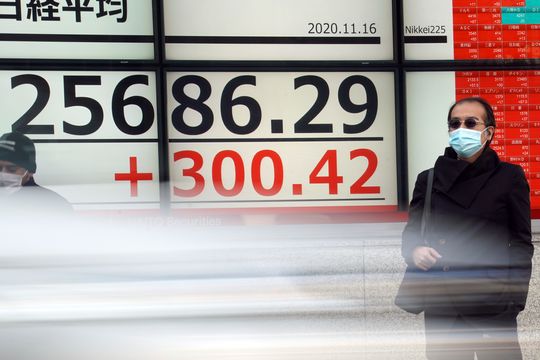Stocks jump in Tokyo after economic report shows robust quarterly growth
Shares started out the week on a strong footing after the S&P 500 hit a fresh high on Friday, with strong data from Japan and China fueling optimism over economic recoveries even as coronavirus caseloads surpass earlier records.
Stock benchmarks rose Monday in Hong Kong, Tokyo and most other regional markets.
Strong Japanese growth data added to confidence the economy is recovering, despite burgeoning waves of coronavirus cases in many parts of the world including Japan. The world’s third largest economy grew at a 21% annual pace in the last quarter, the first quarter of growth in nearly a year.
Investors also were encouraged by Chinese economic data showing a continued recovery in October.
Tokyo’s Nikkei 225 NIK, +2.05% jumped 1.9% and the Hang Seng HSI, 0.57% in Hong Kong edged 0.4% higher. The Kospi 180721, 1.97% in South Korea picked up 2% and in Australia the S&P/ASX 200 XJO, +1.23% advanced 1.2%. The Shanghai Composite index SHCOMP, 0.86% gained 1%. Benchmark indexes in Taiwan Y9999, +2.09%, Singapore STI, 1.39% and Indonesia JAKIDX, 0.30% rose as well.
China’s factory output rose 6.9% over a year earlier in October, holding steady at September’s rate, government data showed Monday. Retail sales gained 4.3% over a year ago, up 1 percentage point from the previous month. Investment in factories and other fixed assets rose 1.8% in the first 10 months of 2020, up 1 percentage point from the first nine months.
“The national economy sustained the momentum of steady recovery,” said a government statement.
The Japanese data, while strong, are distorted by the size of the earlier declines, noted Robert Carnell of ING Economics, adding “the economy contracted 28.8% in the second quarter of 2020 and still remains well below pre-COVID levels.”
In quarterly terms, the 7.9% contraction in April-June was followed by a rebound of 5%.
“Japan had a slightly stronger than expected bounce-back in the third quarter, but not meaningfully better in the context of the massive swings we are seeing in economic activity,” Carnell said.
Thailand’s share benchmark climbed 1.3% after the government reported the country’s GDP slipped 6.4% in annual terms in July-September, an improvement from a 12.1% contraction in the previous quarter. But economists said the recovery would likely be slow given strict quarantine restrictions that have quashed tourism, a vital source of jobs and revenues.
The S&P 500 closed at a record high on Friday on rising optimism that a vaccine for the coronavirus will help end the shutdowns that have devastated economies.
Markets also welcomed the election of Joe Biden as president and the likelihood of Republican control of the Senate, setting up a divided government that will probably mean a continuation of business-friendly policies. Small-company stocks outpaced the rest of the market this week, reflecting greater confidence in the economy.
The S&P 500 SPX, +1.36% added 1.4% to 3,585.15, rising above the index’s previous closing record of 3,580.84 set back in early September. It ended the week up 2.2%.
The Dow DJIA, +1.37% rose 1.4%, to 29,479.81 and the Nasdaq COMP, +1.02% rose 1% to 11,829.29.
News from drug maker Pfizer PFE, +2.85% earlier in the week that preliminary trial data showed its vaccine to be 90% effective against COVID-19 drove investors to sell the high-flying technology stocks that have powered the markets most of the year and to snap up beaten-down sectors like banks and energy. Stocks in the S&P 500 energy sector rose more than 16% this week, while tech stocks were essentially flat.
Coronavirus caseloads are rising at a faster pace in the U.S. in almost every state. That has had a sobering effect on markets from time to time. Even excitement over possible vaccines has been tempered by expectations that even if a vaccine is finalized soon, it will take months for it to be distributed throughout the U.S. and around the globe.
“The vaccine enthusiasm booster shot remains the dominant narrative, even with surging infections across the U.S.: now more than 1 million since the start of November,” Stephen Innes of Axi said in a commentary.
In other trading, benchmark U.S. crude oil CLZ20, 1.50% gained 52 cents to $40.65 per barrel in electronic trading on the New York Mercantile Exchange. It lost 99 cents to $40.13 on Friday. Brent crude BRNF21, 1.22%, the international standard, picked up 42 cents to $43.20 per barrel.
The U.S. dollar USDJPY, -0.05% slipped to 104.52 Japanese yen from 104.65 yen.

